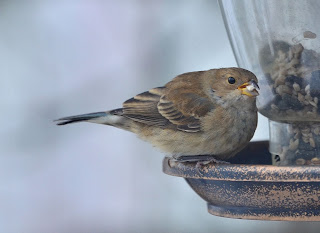NATURE
MONCTON INFORMATION LINE, December 24,
2019 (Tuesday)
Click on photos to enlarge them to full size
of your monitor.
To respond by e-mail, please address
your message to the information line editor, nelsonpoirier435@gmail.com .
Please advise the editor at nelsonpoirier435@gmail.com if any
errors are noted in wording or photo labelling. Note that corrections,
deletions, or delayed additions may not always appear on the Info Line and
email transcript but will always appear on the BlogSpot. For this reason, it is
recommended that those wishing to look at historical records use the BlogSpot
rather than the email transcript. The BlogSpot can always be accessed from
the website.
Edited by: Nelson Poirier nelsonpoirier435@gmail.com
Info Line # 506-384-6397 (384-NEWS)
** I wonder what the chances are of two INDIGO BUNTINGS [Passerin indigo] showing
up almost a week apart in December, at feeder yards approximately two
kilometers away from each other? Jamie and Karen Burris had an Indigo Bunting
arrive at their Riverview feeder yard on Monday, December 23rd.
Jamie’s clear photos show it is not the same bird as the one that appeared at
my Moncton feeder December 6th-14th. Jamie’s bird appears
to be a female while mine appeared to be a male. They were choosing the same
menu of white millet and sunflower chips, however Jamie commented that it did
not seem to have the same tail-flicking behaviour that mine did. I am attaching
Jamie’s photos from Monday, Dec. 23 as well as some of those he took at my
feeder earlier on Dec 7.
** Brian Coyle shares some recent trail footage he got from a wooded area
across from his Upper Mountain Road home. There’s a very large rock there that
seems quite popular. One clip is of a BOBCAT [Lynx roux] strutting
about. If one looks closely, the bobbed tail is black on top and white on the
underside; a less-likely LYNX would have a totally black tail tip. Also the
paws are smaller and the legs tend to be shorter than a Lynx, almost
Spaniel-style.
Brian also got some COYOTES [Coyote] leaping
on and off of that same rock. I suspect that those animals get a better view of
the area from this higher vantage point. Check out the videos at the attached
links.
When viewing the video of the BOBCAT, turn up
the volume; just after it goes out of sight, you can hear it scratching on the
post that the camera is mounted on. Also, if you listen real closely, about the
same time as a BLACK-CAPPED CHICKADEE [Mésange à tête noire] chimes
in, there appears to be a murmuring sound from the cat as it scratches.
** Peter Gadd witnessed a RAVEN [Grand corbeau] taking a RED SQUIRREL [Ecureuil
roux] prey in
an open lawn area. It was a tussle, but the Raven won out. It shows the pseudo-raptor
abilities of the Raven, as many have witnessed on the Tantramar Marsh when the MEADOW VOLE [Campagnol
des champs] population
was high. I suspect a Red Squirrel would give a great deal more resistance than
a VOLE. Note the ruffle on the neck, not seen on a CROW, and the much larger
bill.
Nelson Poirier,
Nature Moncton
INDIGO BUNTING (FEMALE) DEC 23 2019 JAMIE BURRIS
INDIGO BUNTING (FEMALE) DEC 23 2019 JAMIE BURRIS
INDIGO BUNTING DEC 7 2019 JAMIE BURRIS
INDIGO BUNTING DEC 7 2019 JAMIE BURRIS
INDIGO BUNTING DEC 7 2019 JAMIE BURRIS
RAVEN WITH RED SQUIRREL PREY. DEC 23, 2019. PETER GADD





